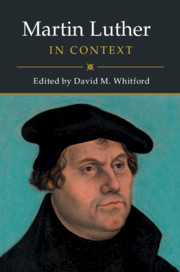Book contents
- Martin Luther in Context
- Martin Luther in Context
- Copyright page
- Contents
- Contributors
- Introduction
- Part I Life and Education
- Part II Religious and Intellectual Context
- Part III Social and Cultural Context
- Part IV People
- Part V Themes in Luther’s Thought
- Part VI Works
- Part VII Reception
- 43 The Anabaptists
- 44 John Calvin and Calvinism
- 45 The English Reformation
- 46 Discord and Concord
- 47 Luther as a German Hero
- Index
- References
46 - Discord and Concord
From the Wittenberg Reformation to Lutheranism
from Part VII - Reception
Published online by Cambridge University Press: 16 August 2018
- Martin Luther in Context
- Martin Luther in Context
- Copyright page
- Contents
- Contributors
- Introduction
- Part I Life and Education
- Part II Religious and Intellectual Context
- Part III Social and Cultural Context
- Part IV People
- Part V Themes in Luther’s Thought
- Part VI Works
- Part VII Reception
- 43 The Anabaptists
- 44 John Calvin and Calvinism
- 45 The English Reformation
- 46 Discord and Concord
- 47 Luther as a German Hero
- Index
- References
- Type
- Chapter
- Information
- Martin Luther in Context , pp. 400 - 408Publisher: Cambridge University PressPrint publication year: 2018



